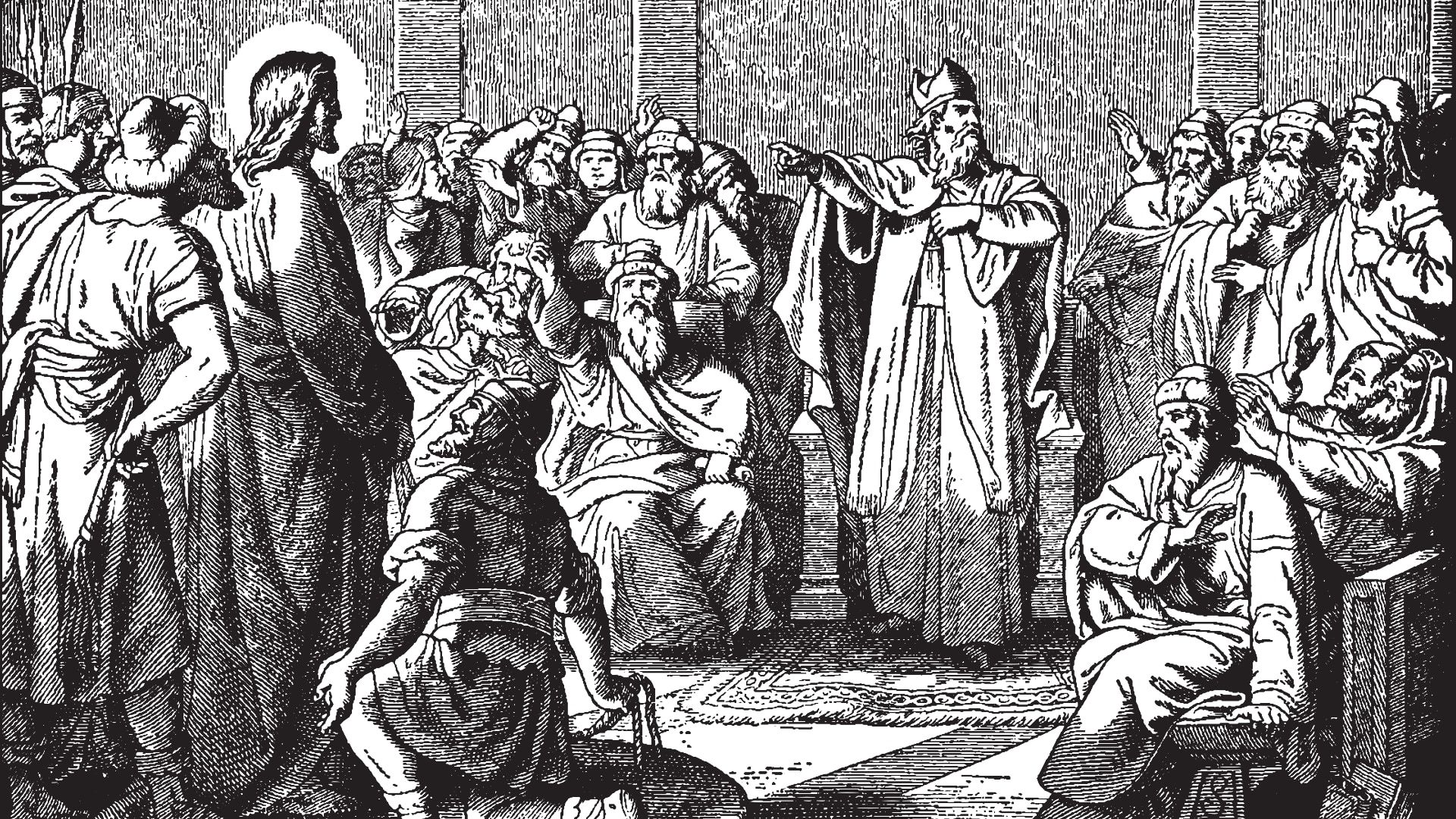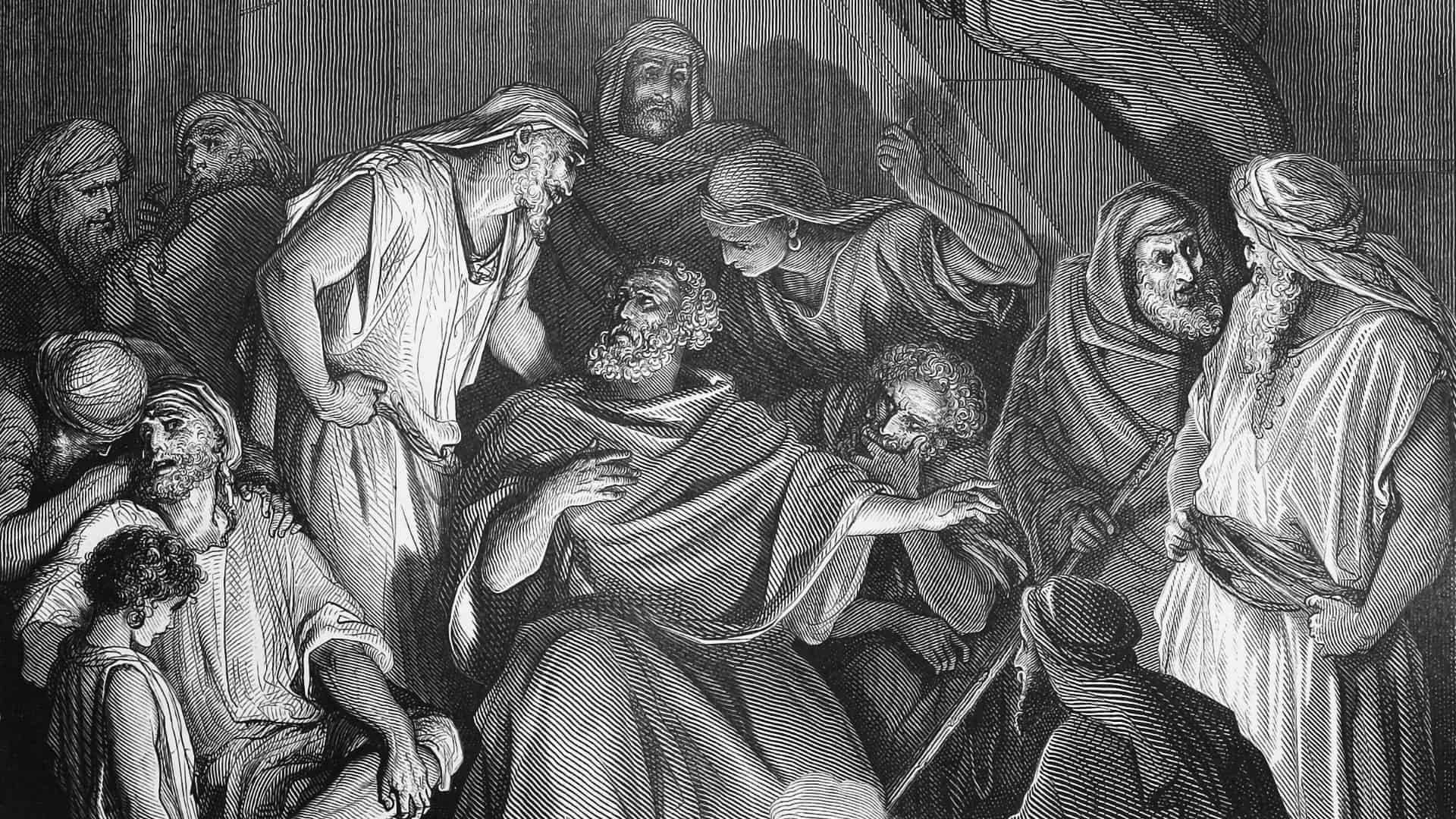Enduring the Shame (Mark 15:16-32)

We’re in Mark 15 this morning. Jesus has been tried and condemned, and abandoned by everyone. We are now moments away from his death in this passage.
But before Jesus is killed, we have an interlude. And in this interlude we notice two things. One: that Jesus is mocked. Two: that in the entire time leading up to his death, Jesus does nothing to resist what’s happening. He never raises his voice to defend himself. He willingly endures whatever comes his way as he moves closer to the cross.
As we look at this passage we’re going to see three things. First: we’re going to learn about ourselves. Second: we’re going to learn about Jesus. And then lastly, we’re going to learn about what Jesus accomplished for us not only in his death, but in the hours leading up to his death.
First: let’s learn about ourselves in this passage.
What’s shocking in this passage is the extent to which Jesus is abandoned. Look at this passage and what takes place immediately before:
- In 14:43, Judas – one of the twelve disciples that Jesus had chosen – betrays him with a kiss.
- in 14:51, another one of his followers runs away naked. Some think that this person is Mark himself. Whoever it is, it points to the complete failure of Jesus’ friends to support him when the moment came.
- In 14:65, members of the Sanhedrin – the top religious leaders – spit on Jesus, covered his face, and struck him.
- In 15:13-14, the crowds call out for Jesus’ death.
- In 15:15, Pilate had Jesus scourged. Scourging meant that Jesus was tied to a post and beaten with a leather whip that had pieces of bone and metal that would tear through the skin. Scourging itself was sometimes fatal.
- In 15:16-20, the guards sarcastically mocked Jesus as a supposed king.
- In 15:29-30, those who passed by the scene of the crucifixion mocked Jesus. They wagged their heads and taunted him.
- In 15:31-32, the chief priests and scribes joined the mocking.
- In 15:32, even those who were being crucified alongside Jesus joined in and mocked him.
It’s absolutely shocking as we read this. Jesus is completely and utterly abandoned by everyone. Jews and Gentiles, religious and non-religious, leaders and ordinary folk, and even criminals join in the mocking. His own friends betray him.
What is this supposed to teach us? Martin Luther, a monk and Reformer who lived 500 years ago, wrote:
Let us meditate a moment on the passion of Christ. Some do so falsely in that they merely rail against Judas and the Jews.
Let’s stop there for a minute. Luther was saying that 500 years ago, some would open up the Bible as an excuse to attack Judas or the Jewish people. In other words, the Bible became a tool they used to point the finger at others, and even to engage in racist behavior. Luther continues:
The true contemplation is that in which the heart is crushed and the conscience smitten…Take this to heart and doubt not that you are the one who killed Christ. Your sins certainly did, and when you see the nails driven through his hands, be sure that you are pounding, and when thorns pierce his brow, know that they are your evil thoughts…The whole value of meditation of the suffering of Christ lies in this, that man should come to the knowledge of himself and sink and tremble.
Do you see what Luther is saying? There are two ways to read this account. One is to read it and to shake our heads at the people who mocked Jesus. We look at them and condemn them. The other way to read this account is to contemplate that this is a passage that reveals our hearts. This passage shows us to be enemies of God who abandon and mock him, because nobody is excluded from this passage. Everybody joins the mocking. Everybody abandons Jesus. As Luther says, “The true contemplation is that in which the heart is crushed and the conscience smitten.”
This passage both humbles us and raises us up. First, it humbles us. You know, it’s easy to blame a group of people to which you don’t belong. We’ve all been parts of groups in which we begin talking about the faults of others who aren’t like us. But what if we are all put on even ground, and what if there is no difference between us? That’s exactly what happens in this passage. Everyone is humbled. Everyone abandons Jesus. The religious mock him; so do the irreligious. Jews mock Jesus; so do the Gentiles. His friends abandon him; strangers shake their heads at him. Nobody gets off. Everyone is humbled as we read this passage.
But this passage also raises us up. What do I mean by this? Because we’re all in the same boat, nobody here can claim superiority over the other. Everyone of us is equal in our need for Christ. We’re all brought to the point of sinking and trembling. But we’re going to see in a moment that there is hope for us in this passage as well.
This is the first thing that Mark asks us to see in this passage. Everyone is guilty. Everyone abandons Jesus. Everyone joins in the mocking. All of us are humbled. All our hearts our crushed, and all of our consciences are smitten.
Secondly, let’s learn about Jesus.
If you’ve ever been falsely accused, you know how you want to respond. You are going to let people know the truth. There’s no way that you are going to allow people to spread falsehood about you and to ruin your good name. Yet in this passage, Jesus is falsely accused and verbally attacked, and he says nothing. He’s silent.
If you’ve ever been physically attacked, you know that we all instinctively either fight or flee. But in this passage Jesus does neither. He endures the blows and is beaten and shamed, and he doesn’t raise a voice or a fist to defend himself.
This is especially significant because had Jesus stuck up for himself, he would have been very convincing. Adrian Rogers writes:
If Jesus had risen up in his own defense during his trials, I believe he would have been so powerful and irrefutable in making his defense that no governor, high priest, or other legal authority on earth could have stood against him! In other words, if Jesus had taken up his own defense with the intention of refuting his accusers and proving his innocence, he would have won!
We’ve seen that Jesus is incredibly convincing whenever he’s had a verbal confrontation with anyone in this gospel. Jesus is never at a loss for words. But in this passage, Jesus says nothing in his defense, nor does he make any move to avoid what’s happening to him. Centuries earlier, the prophet Isaiah had written of Jesus:
I offered my back to those who beat me,
my cheeks to those who pulled out my beard;
I did not hide my face
from mocking and spitting.
(Isaiah 50:6)
In other words, Jesus willingly endured the mocking and the spitting. Hebrews 12:2 puts it this way: “For the joy set before him he endured the cross, scorning its shame.” It’s here that we learn something very important about Jesus.
What do we learn? In a sense, everything that is said about Jesus is true in this passage. They mock him as King of the Jews; ironically, they’re right. He is the King of the Jews, except he’s a king who suffers. Read verses 29-32:
Those who passed by hurled insults at him, shaking their heads and saying, “So! You who are going to destroy the temple and build it in three days, come down from the cross and save yourself!”
In the same way the chief priests and the teachers of the law mocked him among themselves. “He saved others,” they said, “but he can’t save himself! Let this Messiah, this king of Israel, come down now from the cross, that we may see and believe.”
What are they saying? They’re calling on him to save himself. They accuse him of saving others, but not being able to save himself. And in a way they’re right. Don Carson imagines what it would have been like if Jesus had taken them up on their challenge:
This would be a pretty remarkable and convincing display of power, and the mockers would be back-peddling pretty fast. But in the full Christian sense, would they believe in him? Of course not! To believe in Jesus in the Christian sense means not less than trusting him utterly as the One who has borne our sin in his own body on the tree, as the One whose life and death and resurrection, offered up in our place, has reconciled us to God. If Jesus had leapt off the cross, the mockers and other onlookers could not have believed in Jesus in that sense, because he would not have sacrificed himself for us, so there would be nothing to trust, except our futile and empty self-righteousness.
But then Carson explores the meaning of their statement, “He saved others, but he can’t save himself.” Carson says:
The deeper irony is that, in a way they did not understand, they were speaking the truth. If he had saved himself, he could not have saved others; the only way he could save others was precisely by not saving himself. In the irony behind the irony that the mockers intended, they spoke the truth they themselves did not see. The man who can’t save himself–saves others.
One of the reasons they were so blind is that they thought in terms of merely physical restraints…But those who know who Jesus is are fully aware that nails and soldiers cannot stand in the way of Emmanuel. The truth of the matter is that Jesus could not save himself, not because of any physical constraint, but because of a moral imperative…It was not nails that held Jesus to that wretched cross; it was his unqualified resolution, out of love for his Father, to do his Father’s will–and, within that framework, it was his love for sinners like me. He really could not save himself. (Scandalous)
Jesus was completely capable of saving himself – but then he couldn’t have saved us. So he willingly chose to endure the mocking and the spitting. He willingly chose to suffer and die so that we could be saved. He chose death so that we could live.
What is this about? Maybe a movie from 1938 will help. The movie is called Angels with Dirty Faces. James Cagney plays the part of Rocky Sullivan, a celebrity criminal who is the hero of all the young juvenile delinquents in the city. He’s about to go to the electric chair. The night before his execution, he’s visited by his childhood friend Jerry, who is now a priest trying to save inner-city kids from a life of crime. Jerry makes a request of Rocky. He asks Rocky to disgrace himself so that his juvenile followers can live.
I want you to let them down. You see, you’ve been a hero to these kids, and hundreds of others, all through your life – and now you’re going to be a glorified hero in death, and I want to prevent that, Rocky.
Rocky can’t believe it.
You asking me to pull an act, turn yellow, so those kids will think I’m no good… You ask me to throw away the only thing I’ve got left… You ask me to crawl on my belly – the last thing I do in life…Nothing doing. You’re asking too much… You want to help those kids, you got to think about some other way.
Jerry is saying to Rocky, “It’s them or you. If you go down in glory, these kids are going to go down in shame. But if you go down in shame, if you’re willing to throw away everything you have, your entire reputation, then they can be saved.” But Rocky refuses.
The next morning he walks out to the execution chamber as Father Jerry watches. He comes out with a snarl. When one of the guards insults him, he slugs him. He’s in control. He’s going down in glory. But when he gets to the door of the death chamber, suddenly he begins to squeal like a child. “No! I don’t want to die! Oh, please! I don’t want to die! Oh, please! Don’t make me burn in hell. Oh, please let go of me! Please don’t kill me! Oh, don’t kill me, please!”
Father Jerry, as he sees that happen, looks to heaven. The next day, the newspaper says:
At the fatal stroke of eleven p.m. Rocky was led through the little green door of death. No sooner had he entered the death chamber, than he tore himself from the guard’s grasp, flung himself on the floor, screaming for mercy. And as they dragged him to the electric chair, he clawed wildly at the floor with agonized shrieks. In contrast to his former heroics, Rocky Sullivan died a coward.
You see what Rocky did? He substituted his life for the boys. He gave up his reputation so that he could save others.
You see, we are in that story. We are those boys whose life is about to go down. And Jesus is in the story too. He can either save his reputation and his life or save us. And in the most stunning reversal, he offers his life and his reputation so that we could be saved. He substitutes his life and everything he has for us.
Friends, we’ve seen ourselves in this passage this morning. We’re crushed because we are the ones who mocked him. We’ve seen Jesus in this passage. He willingly endures the mocking and the spitting, because he can either save himself or us. He can’t do both. And amazingly, he chooses to save us. There’s one more thing we need to see this morning.
Finally, let’s see what Jesus accomplished by enduring the shame.
Have you ever been shamed? I mean, really shamed? We see it happen with celebrities and politicians. Scandal hits, and somebody’s good name becomes fodder for the late night comedians. We’ve seen it in business. You spend a lifetime building a good reputation, and you hit one rough patch and your name becomes mud. Think of the worst thing that you’ve ever done being made public. It would be enough to disgrace every person here.
What does that have to do with this morning’s sermon? You’ve probably been told that Jesus died for your sins. I believe that this morning’s passage also teaches us that Jesus did more than this. Adrian Rogers puts it this way: “The Bible teaches that when Jesus took our sin, he took all the punishment that goes with that sin. A part of that punishment is shame.”
You see, Jesus assumed your sin. But in this passage he also assumed the shame. Jesus didn’t just die; he was humiliated and shamed so that you don’t have to be. Romans 10:11 says, “Anyone who believes in him will never be put to shame.”
As one person put it, “You don’t have anything to prove to us or the world. The work is finished at Calvary, and that work has unlimited meaning and value. Keep your focus there” (Jack Miller). You have nothing to prove. You never have to be ashamed. Jesus took all the shame. And anyone who believes in him will never be put to shame.
So Father, humble us this morning. We see ourselves clearly in this passage. We are those who mocked him. Everybody abandoned him. Our hearts are crushed, and our consciences are smitten.
But we see Jesus, who willingly endured the mocking and the spitting. He couldn’t save himself and us at the same time, so he chose to save us. For the joy that was set before him he endured the cross, despising the shame.
Because he took the shame, we don’t have to be ashamed. Help us to trust in him and in what he did. We pray this in Jesus’ name, Amen.





